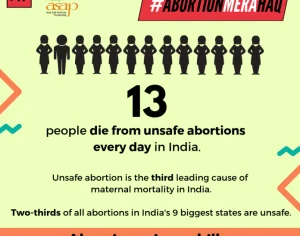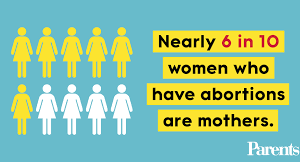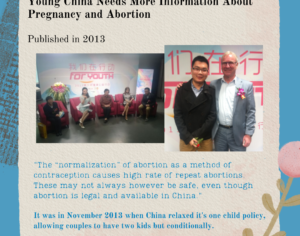A Talk With Dr. Abhijit Das
Last Friday, I had a chance to discuss the commitments made at the London Family Planning Summit with Dr. Abhijit Das, the director of the Center for Health and Social Justice (CHSJ) in New Delhi. Dr. Das held a press conference in advance of World Population Day, and spoke for the need to repeal coercive family planning policies, and formulate laws that empowered women, and gave them the ability to make decisions about their future.
India, he said, should aspire to assume a position of global leadership in the field of reproductive health and rights, by providing its neighbors with the technology and information they need to empower their women.
A day later, Ms. Anuradha Gupta from the Ministry of Health and Family Welfare announced India’s family planning goals for the next 10 years. The ministry hopes to train 860,000 health workers, provide door to door contraceptive services, and open counseling centers for 234 million adolescents, so they can make informed decisions.
But in spite of these ambitious numbers, the announcement felt a little uninspiring: there was little mention of reproductive rights. In the same week, leading newspapers printed a UN assessment of India’s current maternal health programs; India might not meet the MDG goals, according to the UN.
Dr. Das however was not surprised that the Indian announcement at the Summit was far from realistic. His 20 years of experience in the field of reproductive health and rights has taught him that bureaucratic visions are not always pragmatic. Yet he believes that change is possible if India re-orients its family planning programs, and integrates national schemes with projects carried out by civil societies, and private sectors. He shared his views on how to do this:
Involvement of Men: The family planning summit as we pointed out in our previous blogs, unfortunately overlooked the pivotal role men play in the lives of the women in their families. Patriarchal systems have endowed men with rights to make decisions for these women, and it is not possible to empower women without educating men simultaneously.
Dr. Das and his team at the CHSJ have undertaken projects in several Indian states where they educate men on the need to support the women in their families, educate their daughters, limit the size of their families, and care about the health of their wives. A five-part documentary that resulted from this project shows how several men have adopted new ways of lives, and how this benefits the women in their lives.
Dr. Das stressed on the need to include men in conversations about contraception. “Using contraception is not like using soap,” he said. “We all use a type of soap, see its benefits, and decide to make it a habit. It is an individual’s decision.” Using contraception on the other hand, he says, is a decision made by two people in a sexual relationship. “Sex has to be discussed in a power-pleasure paradigm,” he said, “and that must include both partners.” Such discussions will also reduce violence against women, he said.
Several other South Asian countries could also benefit from Dr. Das’s suggestions. Patriarchal systems have allowed men to assume powerful roles in their families, in societies and within sexual relationships, and educating them facilitates conversations on gender equality. This video from Pakistan shows that men become the barriers to contraception, if they are not well informed.
Integrating the Rights-Based Approach: Currently India has a two-child norm, which disqualifies women from applying for financial aid, or assuming positions of leadership if they have any more than two children. These women have no means to become empowered, and are forced to remain steeped in poverty. Dr. Das believes that such coercive policies discriminate against women. While it is meant to restrict the size of their families, it aims to do so, only as a means of controlling the country’s population. A rights-based approach will on the other hand, help women assume positions of leadership irrespective of the size of their families, and help them support themselves and their families better.
Pushing For Safe First-Trimester Abortions: Family planning policies are not complete without comprehensive and liberal laws on abortion, and several countries battle a high number of maternal deaths because of restrictive abortion laws. India’s law, however, remains one of the most liberal laws on abortions. “Even in the U.K., they need three doctors to do a second trimester abortion,” said Dr. Das, “we need only two. This can improve, but we need to push for access first.”
He is particularly in favor of working against abortion stigma and myths, and improving access to safe first trimester abortions. He believes that this alone will help minimize the rates of unsafe abortion, and improve maternal health in India.
His suggestions could help improve maternal health in other Asian countries as well. If women are able to receive the right information about terminations early in their pregnancy, and have access to safe, judgment free abortion services, a number of maternal deaths can be prevented.
Defining the Role of the Private Sector: The private sector is crucial to the supply chain in all family planning programs, but Dr. Das believes that the limitations of their roles have to be better defined. “The private sector does not discuss contraception within the continuum of a power-pleasure paradigm,” he said. “Take iPills. They pushed it as an easy way to avoid pregnancy after the act, and so men could easily coax women into having unprotected sex.” Such promotion absolves men of any responsibility, he said. “But why should 50% of the population have no responsibility.” He also has concerns that such promotion furthers patriarchal values by allowing men to assume positions of power within a sexual relationship.
Unprotected sex is not just a concern for India. In several countries across Asia and South Asia, it is difficult for women to have conversations with their partners about using male contraception. Dr. Das believes that this can be averted if the role of private sectors in promoting such paradigms could be identified. He believes in the need to involve civil societies in promoting contraception, and in increasing access to family planning services.
“Sex has to be discussed under the continuum of relationships, within the power-pleasure-responsibility paradigm,” he said.
In spite of these setbacks, Dr. Das believes that India can rise to a position of leadership. “India already has leadership aspirations,” he said. “They do want to assume a position of significance in the world economy. Family planning cannot be left behind.”










